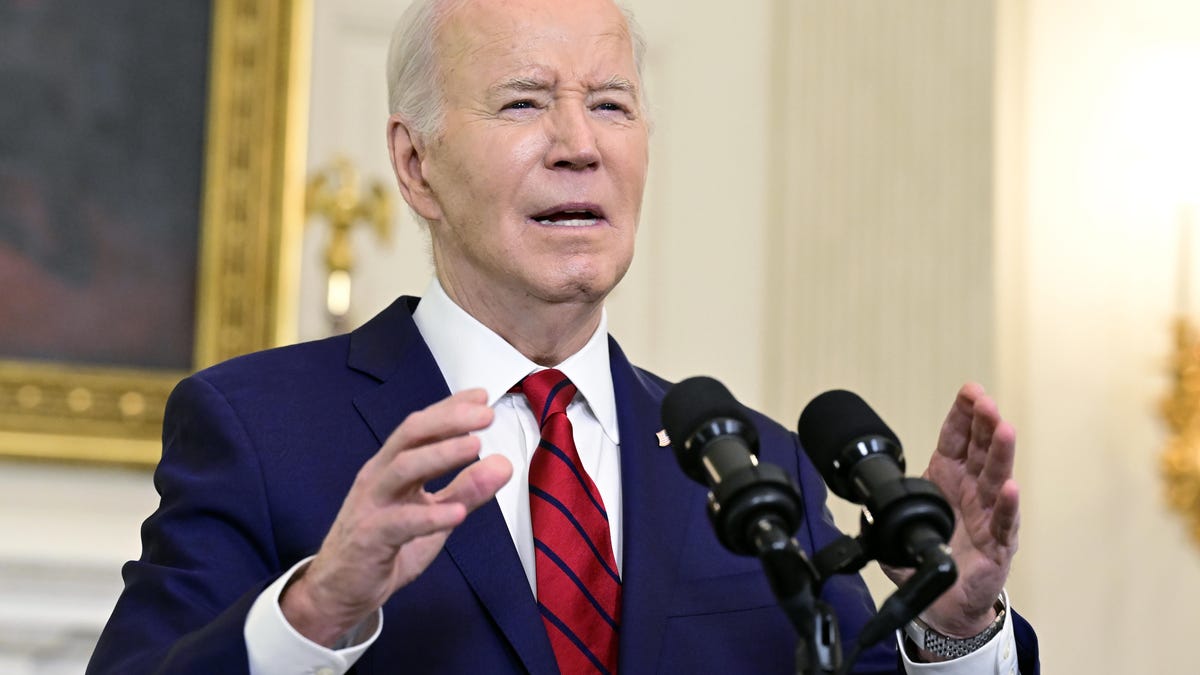President Biden Signs Bill That Could Ban TikTok: What to Know
The president has signed into law legislation that would effectively ban TikTok unless its Chinese parent company sells it. Here's what's next.

President Joe Biden on Wednesday signed into law legislation that could lead to an eventual ban of TikTok, though the popular social media platform and others have vowed to fight the measure in court.
The US Senate voted 79-18 to approve the bill late Tuesday as part of a $95 billion aid package for Ukraine, Israel and other US allies. It gives TikTok's Chinese owner, ByteDance, up to a year to sell TikTok to a buyer deemed fit by US officials.
In a Wednesday TikTok post, Shou Chew, the company's CEO, called the signing of the law "disappointing" and said TikTok will fight it in court.
"Rest assured, we aren't going anywhere," Chew said. "We are confident and will keep fighting for your rights in the courts. The facts and Constitution are on our side and we expect to prevail again."
The House originally passed legislation in March that would've led to a ban unless TikTok was sold off within six months, but the measure failed to gain traction in the Senate. The current version would extend that time period to nine months, with a potential for an additional three-month extension.
Lawmakers in both political parties have long voiced concerns that the popular video app, which has more than 150 million American users, could be a threat to national security and could be used by the Chinese government to spy on Americans or spread disinformation to further China's agenda.
TikTok continues to deny those accusations. Ahead of the March vote on the previous legislation, TikTok rallied its US users, calling on them to urge their representatives on Capitol Hill to vote it down.
Experts say the unprecedented move will undoubtedly prompt legal challenges from free speech advocates, the tech industry and others, especially in the absence of any direct evidence showing Chinese government ties or surveillance.
So what's next for lawmakers and TikTok? Here's what you need to know.
What would the bill do?
The bill is aimed at forcing ByteDance to sell TikTok to a buyer that American officials are OK with, as well as guaranteeing that ByteDance no longer has access to US user data or control over the TikTok algorithm that decides what videos American users see.
If TikTok doesn't comply within nine months of the bill taking effect, the government could require the removal of its app from US app stores. Under the new legislation, that time period could potentially be extended to a full year.
Read more: TikTok Loves to Give Financial Advice. But Don't Believe Everything You Hear
What's next?
While Biden pledged to sign the original bill if it made it through Congress, former President Donald Trump, the presumptive Republican nominee running against Biden in November, has said he doesn't support a ban.
After originally calling for a ban during his presidency, Trump said in March on CNBC's Squawk Box that though he still thinks the app is a danger to national security, he no longer thinks it should be banned, saying that "there are a lot of young kids on TikTok who will go crazy without it."
Trump went on to say that banning TikTok would only boost the power of Facebook, which he referred to as an "enemy of the people."
Read more: Everything You Need to Make Better TikTok Videos
Who else opposes the bill?
Free speech and digital rights groups, as well as some security experts, have long opposed the idea of a ban, saying that singling out TikTok doesn't do anything to solve the broader problems with social media as a whole.
Instead, they argue that lawmakers would be better off passing comprehensive digital privacy laws that would protect the personal information of Americans by stopping all social media companies from collecting it and selling it to data brokers.
In a blog post, the Electronic Frontier Foundation said in March that until that happens, even if TikTok is banned or sold, there's nothing stopping the Chinese government, or others, from just buying up that same data.
"Ultimately, foreign adversaries will still be able to obtain our data from social media companies unless those companies are forbidden from collecting, retaining and selling it, full stop," the EFF said.
Digital privacy rights group Fight for the Future agreed. In a Tuesday statement its director, Evan Greer, called the bill "one of the stupidest and most authoritarian pieces of tech legislation we've seen in years."
"Not only is this bill laughably unconstitutional and a blatant assault on free expression and human rights, it's also a perfect way to derail momentum toward more meaningful policies like privacy and antitrust legislation that would actually address the harms of big tech and surveillance capitalism," Greer said.
Greer added that banning TikTok in the absence of data privacy regulation will only solidify the monopolies of Meta and Google, without doing anything to protect Americans from data harvesting or government propaganda.

